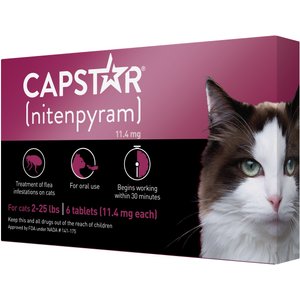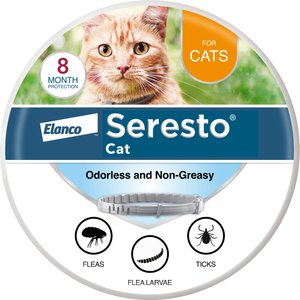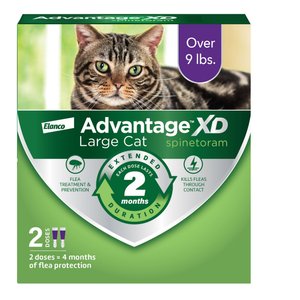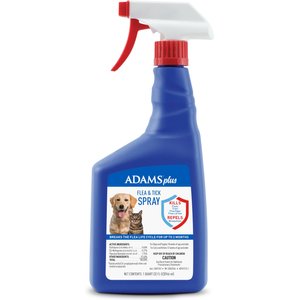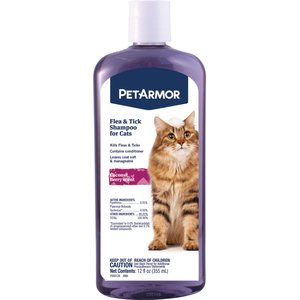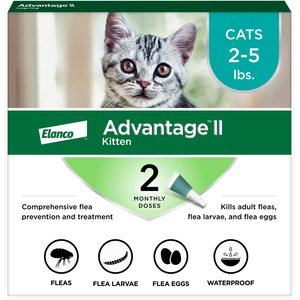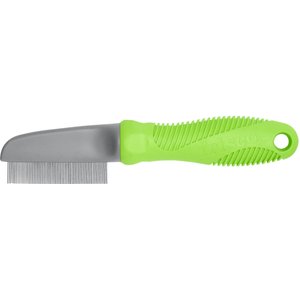Famously clean and self-grooming, cats aren’t commonly associated with fleas and ticks. After all, unlike their canine counterparts, our feline friends are more likely to spend their afternoons napping on sunny windowsills, not romping through leaf piles at the park. However, cats—even those who never venture outdoors—aren’t immune to contracting these pesky pests, and they should be on a cat flea and tick treatment.
"It’s a common misconception that indoor cats do not require flea and tick prevention," says Dr. Bethany Hsia, DVM, a California-based veterinarian and co-founder of CodaPet. "Indoor cats can still be at risk for fleas and ticks, as they can be brought into the home on clothing, shoes or other animals. It is still important to protect your cat from these parasites."
Tiny as they may be, fleas and ticks can cause significant health issues, from inflamed skin and hair loss to more serious conditions, including anemia and Lyme disease—so prevention is key. Fortunately, there are plenty of high-quality cat flea and tick treatments on the market, and effective options for every cat (yes, even that cat).
-
1
Best Overall Flea Treatment for CatsRevolution Plus Topical Solution for Cats, 6 Doses (6-mos. supply) $145 on ChewyFREE 1-3 day shipping$145 on ChewyFREE 1-3 day shipping
- 2
-
3
Best Cat Flea CollarSeresto Flea & Tick Collar for Cats, 1 Collar (8-mos. supply) $60 on ChewyFREE 1-3 day shipping$60 on ChewyFREE 1-3 day shipping
-
4
Best Topical Flea Treatment for CatsAdvantage XD Large Cat Treatment, 2 count $56 on ChewyFREE 1-3 day shipping$56 on ChewyFREE 1-3 day shipping
-
5
Best Cat Flea ChewComfortis™ Chewable Tablet for Cats, 6.1-12 lbs (6-mos. supply) $113 on ChewyFREE 1-3 day shipping$113 on ChewyFREE 1-3 day shipping
Types of Cat Flea and Tick Treatments
Each type of cat flea and tick treatment has pros and cons. Consider this your handy cheat sheet.
Topical Treatments
Applied directly to the skin, topical products—also known as “spot-on treatments”—are applied directly on the cat’s skin, typically between the shoulder blades to prevent licking or scratching. Available over-the-counter and by prescription, topicals are absorbed into the cat’s skin. They typically kill adult fleas, flea eggs and flea larvae as well as ticks. Some also protect against mites, hookworms and roundworms. “Topical treatments are convenient and easy to apply, making them a popular choice among pet owners,” says Dr. Hsia. “They provide about a month of protection against fleas and ticks.”
Best for: Cats who don’t like taking medications orally; multi-pest protection; and killing fleas, flea eggs and larvae
Oral Flea Treatments
If your pet isn’t picky about pills, oral cat flea treatments can be a great alternative to topicals. “Oral treatments come in the form of chews or tablets, and are ideal for cats who dislike topical treatments or have skin sensitivities,” says Dr. Hsia. Oral treatments are absorbed into the bloodstream, killing fleas and ticks after they bite your pet. Some oral medications, such as Capstar, begin working within 30 minutes, making them ideal for cats who already have fleas.
Best for: Cats with skin allergies; cats with active flea infestations; and cats who easily take oral medication
Flea Collars
Although not typically used as a first-line of defense against parasites, flea collars can be effective for cats who need added protection, such as cats with outdoor access. “Flea collars are most effective when used in combination with other prevention methods, such as topical treatments or oral medications,” says Dr. Hsia. Collars typically offer longer-term protection (up to eight months) and kill fleas and ticks on contact, as well as repel them.
When choosing a flea collar, look for one that is specifically designed for cats and provides protection against both fleas and ticks, Dr. Hsia says. “Additionally, ensure that the collar fits properly and is not too tight or loose around your cat’s neck,” she adds. (The general rule is you should be able to fit two fingers between the collar and your pet’s neck.)
Best for: Cats who need extra parasite prevention; cats with outdoor access; and pet parents who want longer-term coverage
Flea Shampoo for Cats
Bathing a cat probably wasn’t on your pet-parent Bingo card, but flea shampoos can be effective pest problem-solvers. These formulas typically kill fleas on contact, making them ideal for pets with active fleas; many also contain skin-soothing ingredients. “Rinse your cat thoroughly to ensure all shampoo residue is removed from their fur, and monitor your cat for any signs of irritation or adverse reactions,” Dr. Hsia says.
Best for: Cats who actively have fleas; cats who tolerate baths
Flea Spray for Cats
Flea sprays are applied to a cat’s coat, killing adult fleas and ticks on contact. Sprays can be great fast-acting solutions for cats who won’t happily bathe or accept an oral medication, and can be effective for up to 30 days (although some formulas need to be applied more often). However, they aren’t ideal for cats with skin allergies, and some pets might not tolerate being sprayed.
Best for: Cats with flea infestations; cats who don’t tolerate baths or oral medications
Best Overall Flea Treatment for Cats
-
Can't tell, but that is the point
My three cats are treated with this monthly, and so far I haven't seen any parasites or fleas, or ticks, as an issue. However, they are mostly indoor and only go out into a catio, on a deck, and don't get a lot of time in grass. The dog is also treated with something else, and hasn't brought fleas/ticks, etc into the house that I have noticed. So I think this works. I do wish it would help with mosquitoes too, but I guess that is just one thing too many, lol.
-
Best flea med
This is the absolute best flea med for cats. It kills fleas, ticks, etc but it also helps prevent heart worms and stomach worms. It is a prescription so you will need a vet to examine your cat and then prescribe it. Then order this from Chewy and Chewy will contact the vet for the prescription. It is so worth it!
-
Awesome Service
This was the first time I used the pharmacy. It was so easy. Chewy contacted my Veterinarian and my order was received in 3 days
Best Flea Pills for Cats
-
Capstar
It had me really scared at first because my cat was crying constantly and I was thinking of the Veterinarian till I read the insert which stated that behavior is normal till the fleas die off & it was right! She was fine afterwards. It's good medicine and it works well! I do recommend Capstar.
-
It Works!!
This is one of the best on the market! Recused my baby from the woods CT. and he was cover in fleas and had a tick by his chin. I gave Him a tablet in a temptations lockable treat cup along with a frontline. within a hour I saw a difference in his behavior and the non stop scratching. Get it you won’t regret it.
-
Ticks and Fleas? Not Anymore!
This product has been exactly what I needed for my furry friend. The mess-free, odor-free tablets are super easy to administer and provide fast-acting relief. Incredible how it starts working in just 30 minutes! It's been effective in killing adult fleas, which is exactly what I needed. Highly recommend for any pet parent dealing with a flea problem.
Best Cat Flea Collar
-
MY CHOICE
i HAVE USED THESE FOR SEVERAL YEARS NOW FOR MY CATS--BEST FLEA PROTECTION EVER WITH NO DRAWBACKS. GLAD YOU OFFER THEM FROM CHEWY-VERY CONVENIENT--THANK YOU.
-
Seresto Collars Best Bang for Buck
We buy Seresto flea/tick collars for our cats and dogs. None of our pets has ever had a health issue from having worn the collar, and the flea/tick protection lasts for almost a year. The collars do NOT protect them from heartworm, however, so be sure to give your pets some form of heartworm protection in addition to the collar.
-
Bug control
This is the best bug control for both cat and dog on the market today. Used for over 6 yrs now. Would not ever use another product again. The best.
Best Topical Flea Treatment for Cats
-
Advantage XD
I’ve been applying Advantage XD for small cats on my kitties since they were 7 months old. Now that they are 1 year old I apply Advantage XD for large cats. It’s safe and effective for flea control. Very Happy Momma !!!!
-
Flea control
After Advantage II stopped working for flea control on my cats, I switched to Advantage XD and it worked very well the first time I used it. It’s only been 2 weeks since treatment, but still working so far.
-
Finally!!
Seriously spent the last 3 months using everything.. almost broke down and took my 2 cats to the vet for an rx.... tried this and FINALLY an over the counter med that actually kills those tiny demons
Best Cat Flea Chew
-
It works
Fleas were dying where I could see them within 1 1/2 hours and completely gone and the cat was comfortable the next day
-
Effective with no side effects
This flea medication is the only med that works for my little doggie, I’m so happy they brought it back in the market after so many months of discontinuing it, my dog has been miserable without it. I tried others but they didn’t do anything plus the nasty side effects such as redness on the skin, nausea or vomiting. but this med has zero side effects! Not to mention helpful customer service from Chewy, The only con is its pricey but this is the cheapest compared to other websites
-
Trust
Chewy lives Lives...my little ones are precious to me. I can always count on Chewy to get me the quality, quantity, and even the timing. Thank You Chewy.
Best Flea Spray for Cats
-
Adams Flea and Tick Spray doesn't smell
Unlike the more "natural" sprays that smell and that the dogs did not like, this one doesn't smell the dogs would tolerate it.
-
Used this for years, very effective
I've used this for years and prefer it to some of the newer options that have bad side effect profiles. To me this is one of the safer options to get rid of fleas and ticks immediately and prevent them from laying eggs.
-
Safe flee spray for dogs and cats
I have used Adam’s Flee spray for many years. It’s safe for cats and dogs. Also great to spray baseboards and carpet at least once a month during hot months. Spray ever 8 days to kill flees and fell eggs from hatching.
Best Flea Shampoo for Cats
-
first bath
Googled best cat shampoo for fleas I purchased pet armor flea and tick shampoo Coconut berry. I discovered that the frontline plus that put on my cats has expired. Google says don’t use after 2yrs Doesn’t say that on the box. So I bought the shampoo. Today mommy had her first bath. it’s a nice scent with a light lather. She seems happy, which makes me happy. Thank you Chewy
-
works great!
Killed fleas almost instantly, my cat has a thick coat so it makes it hard to wash him but this stuff works, whatever fleas that miraculously lived ran up off his skin after a couple minutes and made it easier to comb them out
-
Worked great, non-irritating, smelled nice
We randomly got a bout of fleas and went whole hog on the defensive. We used capstar, immediately got them on a monthly topical, treated the house and the yard, and bathed them. This was our shampoo of choice. Both cats tolerated it very well and had a nice smell. Rinsed clean and helped us get rid of the fleas. We haven’t had a single flea since but this was just part of our approach.
Best Flea Medicine for Kittens
-
Worked well for a rescue cat!
For a little, starving (1 to 3 year old) rescue cat this worked great. He was anemic from fleas along with starving. I fed him small amounts every two hours around the clock and bathed him with just warm water, dried him with a towel and a day later used these drops. Within a day or so he was flea free (yea!). I kept him until it was safe to transport him to a rescue situation. While with me he gained 3/4 of a pound, became flea free and became much more alert! Rescue organization thinks he’s going to make it and be pretty healthy!
-
flea free!
I ordered this for my kitty at 8 weeks and after reading reviews I started to get a little freaked out. I waited until around 9 weeks and 2.5 lbs and it went well. She lost her appetite around the 72hr mark and then had foul diarrhea for about 4 more days. Gastro stuff is a normal side effect. I made sure to give her plenty of water. She is great now and has no more fleas!!
-
products great but I accidently through out the $5 coupon. When I realized what I had done the garbage truck was merrily on its way...
Best Cat Flea Comb
-
Great Product for A Great Price
Amazing comb for a good price. Love the fact it works for all fur types for dogs and cats. It doesn't miss a single flea. It floats in the tub and well making it easy to find during bath time. I will definitely be ordering more
-
Best bang for my buck!!
When I ordered this flea comb I wasn't sure what to expect for such a low cost. My opinion has always been that cheaper wasn't always better. Not true in this case! This is a wonderful comb, built very sturdy and effective. The handle is made of a very thick molded rubber that fits my hand securely and grips well. The metal teeth of the comb are very strong, close together and gets those demon fleas. Most get caught in between the teeth of the comb and are held securely until I get them into the killer solution jar. A few have ridden on the teeth of the comb, some jump off, but most still ride on until they get plunged into their...
-
Removes grass stickers from fine-haired cat
Originally bought this type of brush to remove fleas from a new cat (worked great). Now I find it to be the best brush when it comes to removing grass stickers from her fur. Keep in mind that not every brush works the same on every type of fur coat. For example, even though my 2 cats are from the same litter, Nikita’s fur is medium length like her brother, Oliver, but she doesn’t have an undercoat. Her hair is more sleek - what some people might call, “baby fine hair”, and so she doesn’t shed very much. When she does shed you’ll find single strands solo. On the other hand, Oliver has been referred to as “wooly”. Medium length...
How to Find the Best Cat Flea and Tick Treatment
Overwhelmed by the amount of cat flea and tick treatments? It’s understandable! There’s no shortage of flea and tick control products on the market, and not every product is right for every pet.
So, where to start? Before beginning any treatment, have a conversation with your veterinarian, who can help you select a medication that suits your concerns and your cat’s needs. Together, you’ll consider the following:
- Your cat’s age: If your cat is very young or very old, conventional treatments may not be appropriate. Most flea and tick medications are unsafe for kittens under 8 weeks, and senior animals with certain health conditions may need special consideration.
- Your cat’s health: Some health conditions will influence which type of prevention you choose for your cat. Some cats with food allergies cannot tolerate the flavoring in chewable tablets, while cats with sensitive skin may need to avoid topical treatments.
- Your cat’s weight: Flea and tick medications are dosed by weight, so be sure to select the appropriate dosage for your pet. (Important: Never use your dog’s medication for your cat. Even if your pets are similar weights, some dog medications contain ingredients that could be toxic to cats.)
- The target pest: While most dog treatments target fleas and ticks, some cat treatments only address fleas. Read the label carefully to ensure it kills the correct parasites.
- Your cat’s personality: Consider which flea products your cat will best tolerate. Are they likely to eat a chewable? Can they tolerate wearing a flea collar? Will they rub the topical gel right off? Does the phrase “flea bath” seem reasonable, or ridiculous?
- Your lifestyle: You’ll also want to take your household into consideration. For example, if you have young children, topical gels or collars might be too tempting for curious little hands.
How to Get Rid of Fleas and Ticks on Your Cat
Is your feline friend hosting some unwelcome guests? If so, you’ll want to get rid of the current flea infestation as well as prevent another one from recurring. This requires a multistep approach:
- Comb your cat with a flea comb, starting at the head and working your way to the tail. Place the removed fleas in a bowl of isopropyl alcohol to kill them.
- Bathe your cat with a flea shampoo after using the flea comb. If you’ve never bathed a cat, consult our expert guide. (Still not confident? Leave it to the professionals, and book an appointment with your groomer or veterinarian; don’t risk injuring your cat or yourself.)
- Use a year-round flea and tick preventive treatment and stick to the schedule. If you’ve lapsed on regular treatments, now is your time to get back on board!
Flea-free is the way to be! For more tips and tricks, check out this step-by-step guide.
How to Get Rid of Fleas and Ticks From Your Yard and Home
Now for the bad news: If your cat has fleas, it’s likely that your home and yard has fleas as well. To get rid of them for good and prevent a reinfestation, consider the following:
- Washing all bedding in hot, soapy water
- Vacuuming rugs, carpets and upholstery frequently, using a flea spray as necessary
- Vacuuming hard surfaces frequently, concentrating on areas near food bowls, litter boxes and pet beds
- Treating your yard with flea spray or hiring a pest management company
For more tips on flea prevention in the home, consult our down-and-dirty cleaning guide.
How We Chose These Products
Fleas and ticks prevent cats (and cat owners!) from living their happiest, healthiest lives. That’s why we rounded up these best-of-the-best products, as chosen by satisfied Chewy customers. Backed by thousands of ratings and reviews, these bestellers have proven themselves to be effective, trusted tools in keeping kitties comfortable.
Talk to Your Veterinarian
Every cat is an individual, so every cat responds to fleas, ticks and treatments differently. If you have any concerns about your pet’s health, medications or side effects, work with your veterinarian to devise a personalized plan for your one-of-a-kind feline.
Cat Flea and Tick Treatment FAQs
Q: What are the symptoms of fleas and ticks on cats?
A: Signs of fleas include intense itching, scratching and biting; changes in behavior; hair loss; excessive grooming; and, in severe cases, pale gums. Signs of ticks include licking, chewing and biting at the area; inflamed skin and/or scabs; hair loss; and, in the case of tick-borne illnesses, lethargy and lack of appetite.
Q: What instantly kills fleas and ticks on cats?
A: Flea shampoos and flea sprays kill fleas and ticks on contact. You can also use a flea comb to find and kill fleas instantly. Some chewable treatments, such as Capstar, kick in quickly, killing fleas in as little as 30 minutes.
Q: How does flea and tick medicine work?
A: Topical treatments are absorbed through the cat’s skin, killing fleas and ticks on contact. Oral preventives are swallowed and absorbed into the cat’s bloodstream; adult fleas and ticks die after biting the cat and ingesting the pesticide.
Q: Are there home remedies to treat and prevent fleas and ticks?
A: There are some home remedies—including Dawn dish soap, lemon, apple cider vinegar and baking soda—that may help to kill or temporarily repel fleas and ticks. However, even natural flea treatments can irritate the skin or cause serious health problems if used incorrectly. Consult your veterinarian before trying any home remedies.
Flea and Tick Control: Next Steps
There’s no denying it: Fleas and ticks are major buggers. Fortunately, with a little know-how and the right products, you can keep the bugs at bay and ensure your cat is happy, healthy and comfy. Have an itchy cat and aren’t sure whether pests are to blame? Learn more about what signs to look for that would indicate a flea infestation.
Expert input provided by Dr. Bethany Hsia, DVM, a California-based veterinarian and co-founder of CodaPet.
More Flea-Fighting Info:
Share:


